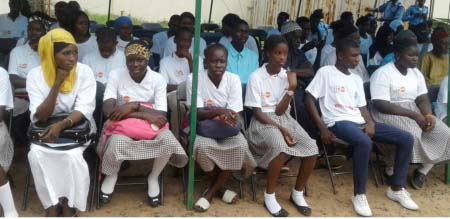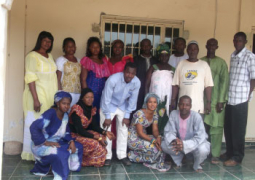
Stratford College of Management in
collaboration with the SOS Mother and Adult Training Centre observed the
International Social Work Day at the American Corner, on 21 March 2017.
Omar Colley, a student of Stratford
College, in his opening remarks, said the observance of International Social
Work Day on the theme: “Promoting community and environmental sustainability”
was to introduce the importance of social work in The Gambia for greater impact
in national development.
Speaking on the objectives of World Social
Work Day, Idika Kalu Idika said the observance of this day was launched in 1983
by the International Social Work committee, and observed every third Tuesday of
March every year.
“It’s a critical relevance in society that
completes the work of nurses, physiologist, therapists and lot more.”
Health facilities and primary education
should employ social workers to advice and help their clients, he said.
He added that their work is to deal with
the physiological and emotional issues of people suffering either from mental,
emotional, health and social well-being problems.
Moreover, he continued, the objective of
this day was to send a message to the community and the government to add more
light on their contribution in the well-being of society.
He also tasked the government and
institutions to broaden their research place to meet the international level on
the needs of people.
Mrs. Karen Sonko said mental illness is a
physical disorder and is treated by a mental health worker.
“It is the responsibility of the social
workers to accomplish their work in improving client’s health; it is their
responsibility to create awareness on how society sees and feels about this
people.”
Mrs
Sonko said the first line of experts are the health workers, families and then
social workers to accomplish their work in making an impact on their clients.
Most challenges they face include stigma,
especially family and religious belief; therefore, their role is to educate,
empower and change the mindset of people.
To motivate their clients, their weakness
and strength should be assessed, she said.
She further advised students and social
workers to know their role and responsibility to have an impact in society, and
that their profession is not to dictate, but respect the opinion of their
clients.
Health workers and the private sector are
their partners to reduce stigma and the approach towards mental and sick
people, she added.
Lloyd London Drakes, who spoke on HIV and
AIDS support and counseling in the community, said stigma is their main
challenge.
More
research should be done on HIV to help social workers have sustainable
achievements in helping the people living with the sickness.
The Director of Social Welfare, Fanta Bai
Secka, said the basics of social work and civic education are been taught in
schools to make an impact in their community.
Poverty is the main issue that contributes
in mental instability, HIV and AIDs, and their aim for now is to eradicate and
minimise the challenge face by society, and also promote social work.
“Workers and students should have the passion
and motivation that they are safeguards that put a smile on people’s faces.”




